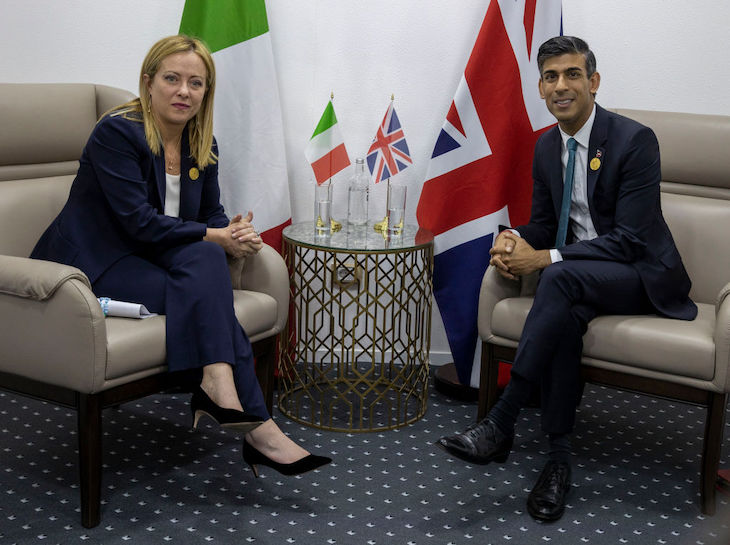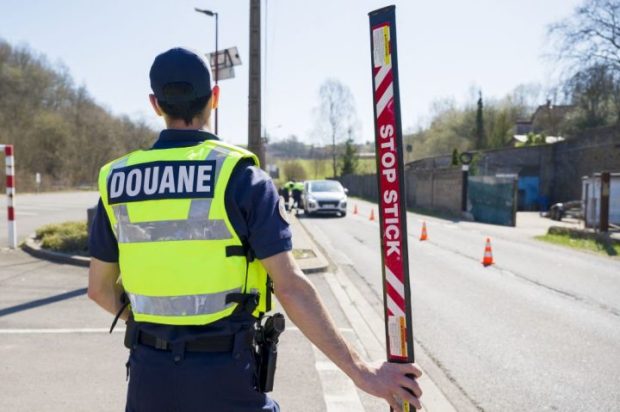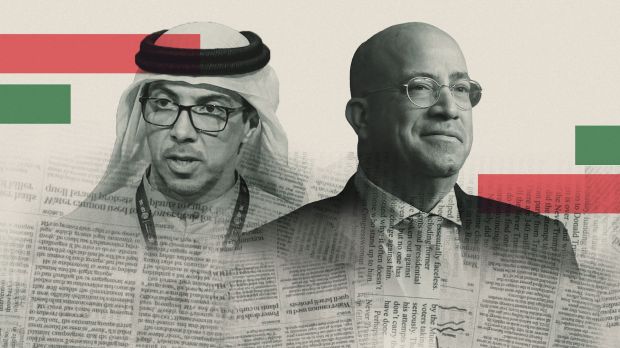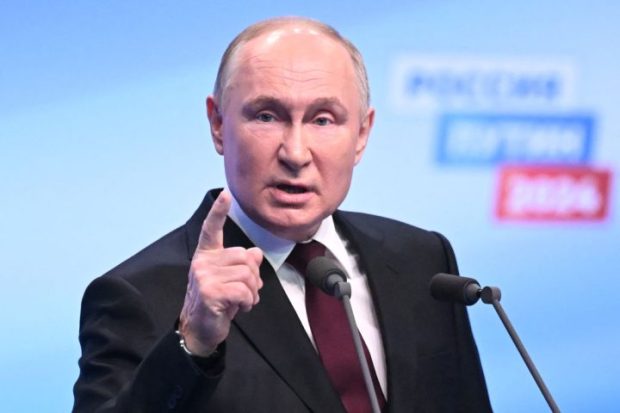The number keep rising. Italy’s Interior Ministry announced at the weekend that 35,085 migrants have arrived on their shores this year, an increase of 27,000 on the same period in 2022. In England meanwhile, 497 migrants landed on the Kent coast on Saturday, a new daily record for crossings.
So the Italian prime minister Giorgia Meloni’s visit to London this week is well timed. She and Rishi Sunak will have much to discuss, aware that to a large extent their political futures hinge on whether they can stop what some of their ministers have termed an ‘invasion’.
Last week, one of Meloni’s cabinet went further. Agriculture minister Francesco Lollobrigida enraged the Italian left when he stated: ‘Italians are having fewer children, so we’re replacing them with someone else. That’s not the way forward.’
Ninety per cent of the 330,000 people who arrived illegally in Europe in 2022 were men
The ‘Great Replacement’ theory was first propagated by the far-right French writer Renaud Camus in 2010. It formed a central plank of Eric Zemmour’s campaign manifesto in last year’s French presidential election. It has also caught the imagination of Tunisian president Kais Saied, who in a tirade in March declared:
‘Migration is a plot to change Tunisian dynamics…The undeclared goal of the successive waves of illegal immigration is to consider Tunisia a purely African country that has no affiliation to the Arab and Islamic nations.’
There will be no ‘Great Replacements’ references from Meloni or Sunak this week, but the two leaders know that no other issue angers their core electorate more than uncontrolled immigration. Fail to bring down the numbers and neither will survive their next general election.
Last week, the Italian president, Sergio Mattarella, visited Poland where he called for ‘coordinated and well-organised action’ from the EU because ‘no state, alone, can deal with such an epochal problem.’
The EU parliament spent last week wrestling with the question of immigration; on Thursday, it approved a migration emergency plan. This stipulates that if an EU country suffers a sudden surge in migrant arrivals, the other member states would be obliged to accept a percentage. This would be done on the basis of any ‘meaningful links’ the migrants might have with a EU nation, such as ‘family ties, cultural similarities or somewhere they have previously studied’.
It is a pointless proposal. The issue isn’t how to disperse migrants once they’re in Europe; it’s how to prevent them entering in the first place. The majority of new arrivals in Italy this year are from the Ivory Coast, Guinea, Pakistan, Egypt, Tunisia and Bangladesh: in other words, many are economic migrants.
Some in the EU Parliament recognise what is unfolding; on Wednesday, an amendment to endorse the financing of border infrastructure was passed by 322 votes to 290. This is part of a broader budget proposal that will be presented to parliament for a final vote in early June.
There is a growing ideological schism within Europe
‘There is no migration policy without border protection and controls,’ said Jeroen Lenaers, spokesman for home affairs for the centre-right EPP Group. ‘If we want to show solidarity, then we must restore the order at our borders, if needed by building fences where they are needed’.
Where they are needed most is Italy. Does the EU propose to encircle the entire Italian coastline in fences and walls? If fences go up along the Greek and Polish borders, all that will happen is that more boats will be sent to Italy from Turkey and North Africa by the well-organised people-smuggling gangs. This year has already seen a marked increase in migrants arriving in Italy from Turkey.
In February, one boat from Turkey carrying 180 migrants broke up off the Italian coast with the loss of more than a third of the passengers. In the wake of that tragedy, Meloni wrote to the EU stating:
‘We need a single European policy on refugees which provides for support outside the EU borders for those affected by wars and calamities’.
This was a reiteration of what Meloni outlined to The Spectator last summer when she said Europe must ‘open up hotspots’ in north Africa (and elsewhere) to process asylum requests.
In her letter to the EU, Meloni stressed the importance of ‘distinguishing between those who have the right to international protection and those who intend to access it for work reasons’.
Few people in Europe object to giving sanctuary to genuine refugees, particularly the elderly, women and children, but they do object to the arrival of strapping young men from safe countries. Ninety per cent of the 330,000 people who arrived illegally in Europe in 2022 were men, a statistic consistently ignored by Europe’s pro-migrant lobby.
Last month, Sunak visited Macron in Paris and the two leaders made a great song and dance about tackling the migrant crisis. But Macron’s heart isn’t in it. He leads a progressive party which, on the whole, believes that the positives of mass immigration outweigh the negatives.
The French president recently shelved his government’s new immigration bill until the summer at the earliest, and it was instructive that many of his party’s MEPs voted against the border infrastructure bill last week. This is despite the fact that there is a growing crisis at the Franco-Italian border, with record numbers of migrants attempting to enter France. Last week Eric Ciotti, the leader of the centre-right Republicans, wrote to the government urging them ‘to restore border controls with the utmost urgency…to prevent a wave of migration from hitting our country’.
Germany and France have run Europe this century, in a manner described by Polish prime minister Mateusz Morawiecki last year as a ‘de facto oligarchy’. The war in Ukraine has painfully exposed the grave strategic mistakes made by the pair, particularly Germany. Yet it appears neither has learned from these blunders; witness the way Macron and Olaf Scholz have been cosying up recently to the Chinese regime. In contrast, according to reports at the weekend Meloni, with the encouragement of the USA, is poised to ‘disentangle Italy from its close relationship with China’.
There is a growing ideological schism within Europe, one which can be exploited by Britain and Italy. Last September, shortly before the Italian election, European Commission president Ursula von der Leyen was asked during a lecture at Princeton university in the USA if she had any concerns about the possibility of a Meloni victory?
‘We’ll see,’ she replied. ‘If things go in a difficult direction – I’ve spoken about Hungary and Poland – we have tools.’
Europe is going in a difficult direction, but it’s nothing to do with Meloni. Rather it’s the incompetence and cowardice of Berlin, Brussels and Paris in everything from energy policy to Russia to mass immigration. It’s time Italy, Britain and the Eastern European nations took back control of the continent.
Got something to add? Join the discussion and comment below.
Get 10 issues for just $10
Subscribe to The Spectator Australia today for the next 10 magazine issues, plus full online access, for just $10.





















Comments
Don't miss out
Join the conversation with other Spectator Australia readers. Subscribe to leave a comment.
SUBSCRIBEAlready a subscriber? Log in